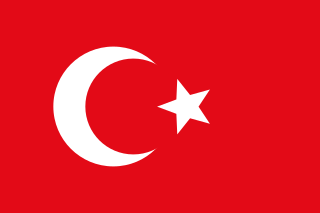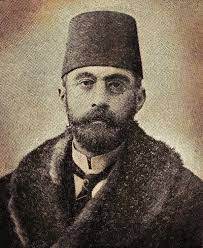
Mustafa Fehmi Kubilay was a Turkish teacher and second lieutenant. He is a symbolic figure of the series of events known as the Kubilay Incident, which began with the killing of Mustafa Fehmi Kubilay, Guard Hasan, and Guard Şevki by an anti-republican group in Menemen on December 23, 1930. The events continued with the trial of the perpetrators and spanned the months of January and February 1931.

The Vilayet of Salonica was a first-level administrative division (vilayet) of the Ottoman Empire from 1867 to 1913. In the late 19th century it reportedly had an area of 12,950 square miles (33,500 km2).

The Menemen Incident, or Kubilay Incident, refers to a chain of events which occurred in Menemen, a small town north of İzmir in the Aegean Region of Turkey, on 23 December 1930.
Hassan or Hasan is an Arabic masculine given name in the Muslim world.
Hasan Pasha or Hassan Pasha may refer to:
Tahsin is an Arabic word which means improve, enhance, or enrich. It is used as a given name for males and females in Arabic-speaking and Muslim countries.

Hasan Fehmi Bey was an Ottoman journalist, who was the editor-in-chief of Serbestî, an Ottoman newspaper owned by Mevlanzade Rifat Bey, in which he wrote articles against the newly emerging Committee of Union and Progress (CUP).
Serbestî was an Ottoman newspaper. It was founded in 1908 by Mevlanzade Rifat Bey, who in 1924 would become one of the 150 personae non gratae of the newly established Republic of Turkey, because the paper and its founder had an oppositional and hostile stance to the independence movement led by Mustafa Kemal.
Fehmi is a Turkish given name for males. It is Turkish spelling of the Arabic name and word Fahmi which means "understanding, comprehension, knowing".
The Karboğazı ambush, also known as Battle of Karboğazı was an engagement recorded in Turkish historiography, fought between the Turkish nationalists and the French battalion on Toros Mountains during the Turkish War of Independence. Karboğazı literally means "Snow Pass".
Çelebi was an Ottoman title of respect, approximately corresponding to "gentleman", "well-mannered" or "courteous". Çelebi also means "man of God", as an i-suffixed derivative from çalab, which means "God" in old Turkish. German linguist and Turkologist Marcel Erdal, citing Baron Tiesenhausen, traces çalab back to Arabic djellaba "importer, trader, merchant" > "high social positions"; jallāb is derived from root j-l-b "to have brought, to import", ultimately from West Semitic root g-l-b "to catch, to fetch".

Hasan FehmiAtaç was a Turkish politician and a member of both the Grand National Assembly of the Republic of Turkey and the earlier Chamber of Deputies of the Ottoman Empire. As a member of both parliaments, Hasan Fehmi was a deputy representing Gümüşhane, the place of his birth.
Events in the year 1931 in Turkey.

The TGC Press Media Museum, aka Istanbul Press Media Museum, is a history and technology museum dedicated to mass communication in Turkey featuring exhibitions about journalism. It is located in the Çemberlitaş neighborhood of Fatih district in Istanbul, Turkey. Established in 1988, it is owned and operated by the Journalists Association of Turkey.
Kınalızâde Ali Çelebi (1510/11?–1572), known with the Islamic name Mullah Ala al-Din Ali Kınalızâde or simply Kınalızade Ali, was an Ottoman high rank jurist and writer.
Fehmî (1564–1596), also referred as Kınalızâde Mehmet Fehmi, Kınalızâde Fehmi Çelebi or Molla Mohammed (Mehmet) Fehmi was an Ottoman diwan poet.

Hasan Fehmi Pasha (1836–1910) was one of the leading Ottoman statesmen during the late Tanzimat period, who served in various governorships and juridical institutions. He was furthermore a member of the Senate, and a supporter of foreign investment, but at the same time an advocate of syndicates formed by multinational capitalists.

Mevlanzade Rifat Bey, was an Ottoman Kurdish journalist and poet.
Hasan Fehmi Güneş was a Turkish jurist and politician who served as the interior minister in 1979. He was a member of the Turkish parliament for two terms from the Republican People's Party. Between 1975 and 1980 he served in the Turkish Senate.

The Lembet Mosque is a historical Ottoman mosque in the city of Thessaloniki, in Greece, named after the Lembet barracks, now known as Pavlos Melas barracks. In 2013, the mosque's original name, Ferideh Hanim Mosque, was discovered thanks to an old inscription. It was named after Ferideh Hanim, the wife of Thessaloniki's then governor, Hassan Fehmi Pasha. It was the last mosque to be built in Thessaloniki before the city's incorporation into the Kingdom of Greece in 1912 following the First Balkan War.







